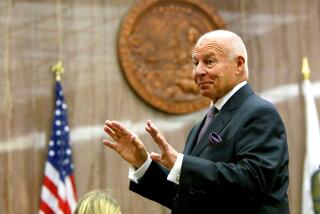Bosnia Probe Finds Fraud by Muslim Officials
- Share via
SARAJEVO, Bosnia-Herzegovina — Muslim officials here have diverted millions of dollars through fraud and tax evasion and may have used some of the money to help pay for illegal agencies, including an Iranian-trained internal spy network, according to Western officials and an in-depth investigation of corruption.
The findings are contained in two reports by European investigators that also detail losses caused by smuggling by Muslim, Croatian and Serbian authorities who evade the payment of customs and other duties.
Widespread corruption throughout Bosnia’s governments is undermining international efforts to rebuild the country after a devastating 3 1/2-year war. Donors and investors are increasingly loath to spend billions of dollars in a country awash in fraud and official theft.
The investigation, by the European Commission Customs and Fiscal Assistance Office, was so sensitive that staffers reported receiving death threats. They worked in a heavily fortified office and sought to keep their findings confidential.
Parts of the reports were made public previously. The Times obtained full texts Wednesday.
Investigators found “systematic and almost routine” fraud and tax evasion totaling more than $25 million.
*
This represents only a fraction of the missing millions of dollars that Western officials believe has been diverted from government coffers to the hands of well-connected individuals and the three nationalist parties that rule parts of Bosnia-Herzegovina.
Muslim officials deny any wrongdoing.
“There is more than a suggestion that this may be just the tip of the iceberg,” Simon Haselock, spokesman for Carlos Westendorp, the senior international peacekeeping official in Bosnia, said Wednesday.
Investigators found, for example, that strategic goods, including up to 100,000 tons of fuel, were imported duty-free, then resold for profit, to the tune of $13 million.
The money, which never appeared on a governmental budget, was then siphoned off to help pay for agencies that should have disappeared when Bosnia’s war ended nearly two years ago and a new constitution took effect, according to officials familiar with the investigation.
The officials believe that these include a Muslim intelligence network, known as the Agency for Investigation and Documentation, which was heavily influenced by Iranian advisors and whose main function is to spy on potential domestic enemies.
Lucrative smuggling operations by Bosnia’s politically sanctioned organized-crime mafias, involving cigarettes, coffee, whiskey, brandy and chocolate and worth $12 million, were also exposed in the investigation.
It is only one part of the money made off smuggling, officials say; in the last six months, at least another $60 million in goods entered Bosnia but never reached their destinations, thus sidestepping duties, according to local press reports.
Westendorp ordered the Bosnian government to respond to the commission investigation by last Friday. But a satisfactory answer had not been delivered by Wednesday, Western officials said.
“It goes without saying there are political and perhaps criminal responsibilities,” Westendorp said upon first announcing the conclusion of the investigation earlier this month. He intends to present a final report Dec. 10 to an international conference on Bosnian peacekeeping.
At Westendorp’s request, a team of international judges and prosecutors is to arrive in Bosnia to conduct a deeper investigation.
Corruption in the Bosnian Serb half of Bosnia has become the highly successful rallying cry of Bosnian Serb President Biljana Plavsic, who has accused her predecessor and now nemesis, Radovan Karadzic, of making millions of dollars from smuggling.
The Sarajevo government, on the other hand, has for the most part dismissed the European commission’s findings with contempt, saying the probes are flawed.
Mirsad Kurtovic, one of the chief alleged culprits who was in charge of importing strategic goods, was promoted this week. He was named foreign trade minister, replacing Hasan Muratovic, who has been implicated in questionable financial deals and who is being made ambassador to Croatia.
In a Nov. 5 letter to Westendorp, Kurtovic said the reports contained “insinuations and inaccuracies.”
Haris Silajdzic, the Muslim co-chair of the Bosnian-Croat Federation’s Council of Ministers who is also named in the report, complained to a local newspaper that the allegations were “malicious.”
Failure to punish fiscal misdeeds, or to more thoroughly control lax transactions, raises questions about the commitment of Muslim President Alija Izetbegovic to eradicating corruption, Western officials assert.
“I don’t believe Izetbegovic personally is corrupt, but he does feel like whoever was loyal to Bosnia-Herzegovina during the war, as he defines loyalty, needs to be paid back for what they did,” said a senior Western official with extensive experience in Bosnia.
That allows corruption to flourish with impunity, the official said.
The government has also been accused by British officials of channeling some of the nearly $2 billion in international reconstruction aid for Bosnia into private or politically connected companies.
More to Read
Sign up for Essential California
The most important California stories and recommendations in your inbox every morning.
You may occasionally receive promotional content from the Los Angeles Times.














